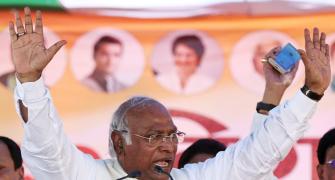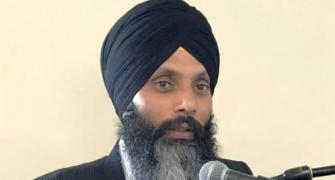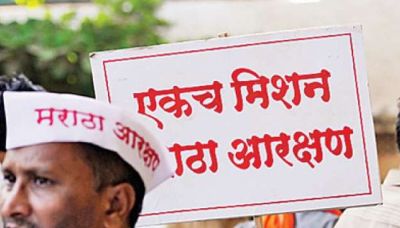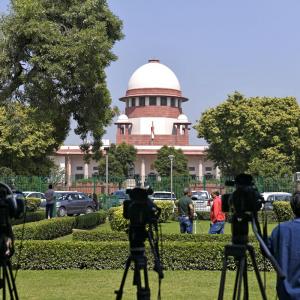Ultimately quotas kill talent and true meritocracy, argues R Jagannathan.

We are having the wrong kind of conversations on inclusion and inequity, both in India and abroad.
In the US, the Supreme Court just handed down a 6-3 verdict outlawing race-based affirmative action programmes in two educational institutions, Harvard and the University of North Carolina.
But even as the courts are reversing decades of 'progressive law-making', politicians are trying to include caste as one more kind of discrimination.
They are thus importing an Indian problem into the US, even as their judiciary is saying race cannot be the entire basis for affirmative action.
In India, we are going in the opposite direction, with quotas now officially breaching the 49 per cent limit set by the Supreme Court in the Indra Sawhney case.
The limit was side-stepped recently by another Bench that validated the additional 10 per cent quota for economically weaker sections.
There is now talk of doing a census on 'other backward classes' (OBCs), which will inevitably lead to another expansion of the quota limit.
This is not about whether the US is right or India is wrong.
In our blind effort to ensure some kind of 'cosmic justice' -- a phrase used by Thomas Sowell, an American economist and public intellectual -- to those we consider underprivileged, we are refusing to confront the real challenges of countering social and economic backwardness.
By mollycoddling some groups with ill-thought-out quotas that have no terminal date, we may actually be dehumanising them by inculcating a permanent sense of victimhood, doing long-term damage to their individual sense of self-worth.
Woke liberals abroad, most of them whites, would like to believe that racism and exploitation are structural in nature, and can be remedied only by reversing the discrimination in favour of non-whites.
In India, we believe the same. We want caste-based inequities to end, but have concluded, without any concrete evidence, that the only way to do so is through quotas, reservations and active discrimination against the previously privileged.
We have now permanently embedded caste into every aspect of public life. How is this progress?
Nobody should question the need for inclusion or greater equity, but why is it that even centuries after the European enlightenment, the American Civil War, our own endless war on 'casteism', and the ever-present Marxist critique of inequality, we don't have better alternatives to quotas and affirmative action?
Let us start with a phrase Marx popularised in a 1875 letter to the Social Democratic Workers Party of Germany, with which he was associated.
He summarised the ultimate goal of Communism in one line: From each according to his ability, to each according to his needs!
This is a remarkable line, not only because it seems to say something profound, but because in practice Marxism has focused more on the second half of the maxim, the redistributive aspect.
Marx believed that his ideal state of a non-exploitative society will be achieved only after the proletariat takes control, but we know that 'dictatorship of the proletariat' does not achieve either of both ends -- maximising individual abilities while meeting everybody's needs.
Ultimately, it only ensured the creation of a new exploitative elite, not an egalitarian society.
Marx also failed to ask a more basic question: Can an individual optimise his abilities in a dictatorship, where the focus is on the collective and not the individual? This is a question that all social justice warriors must ask themselves today.
The problem with woke liberalism, which is really a mutated and mutilated version of the Marxist ideal, is that it buys into the oppressor-victim logic of Marxism.
While it may not recommend dictatorship, it comes close by seeking to cancel those it disagrees with.
The US and Indian liberal establishments are essentially seeking a dictatorship of ideas to push their own agendas forward. They are shrinking diversity, not expanding it.
Let's go back to the Marxist ideal. The question is how do we maximise the individual's ability to contribute even while taking care of those whose contributions may be less substantial.
The end-goal ought to be a balanced, stable, compassionate and caring society, not the victory or defeat of an ideology.
Justice cannot be equal outcomes for unequals, where every profession or institution must have a proportionate sprinkling of individuals based on group identities, not individual contributions and competence.
That is the road to mediocrity, not justice.
The questions to ask are: Can any society optimise its productive capabilities without balancing the twin goals of inclusion and meritocracy? Did the greatest companies, or organisations, or societies get built by ignoring merit in the pursuit of inclusion and equity? Did our IITs, IIMs, ISRO, HDFC Bank or Infosys become world-class by ignoring meritocracy?
We must also ask: What exactly is merit? Does it mean the ability to use your best talent, or the ability to cross an artificial bar set by a difficult examination? If we, for example, equate merit with those who crack IIT-JEE, NEET or CAT, we are reducing merit to a specific set of attributes.
But many IIT engineers end up doing software jobs and not high-quality engineering work.
In short, we are not really selecting for merit and engineering talent, but equating eligibility for a high-paying job with merit.
In a 1999 book, First, Break All The Rules, authors Marcus Buckingham and Curt Coffman suggest that the world's greatest managers find their best performers not through such neutral examination systems, but by noting how individuals are best able to use their innate talents for the specific jobs that need such talent.
In this ideal system, a talented individual, say, a good salesman, is not rewarded by being promoted to vice-president (sales) or even CEO, but rewarded better for continuing the thing he does best.
This is what comes close to the Marxist ideal of getting the best from every individual.
True meritocracies tend to create hierarchies of talent and productivity, not hierarchies of power.
Inclusion and equity are best achieved not by focusing on quotas and non-performance metrics, but by identifying which talent is best suited to achieve the best outcome for each individual and the job at hand.
It is not about artificially inserting a student with weaker math skills in engineering, or asking someone with poor language skills to teach English because there are not enough members from some community in the English department.
The truly talented among the underprivileged need mentoring, financial support and supportive networks to compete with the best, not endless quotas and reservations.
They need to be encouraged to become entrepreneurs, not depend endlessly on deadbeat government jobs.
For seven decades now, we have constantly sent the message that group identity matters for jobs.
What, then, is the subliminal message we are sending on the importance of individual effort and upskilling?
Can we replace discrimination with elite condescension and call this 'progress?'
One cannot quote a better example than Babasaheb Ambedkar, whose tremendous social and intellectual contributions were the result of his own efforts, with marginal support from well-wishers.
Quotas may be inevitable for some time, but ultimately quotas kill talent and true meritocracy.
We must start pilot projects and experiments to create better alternatives for a post-quota future. Quotas will not create the next Ambedkar.
R Jagannathan is editorial director, Swarajya magazine
Feature Presentation: Aslam Hunani/Rediff.com











